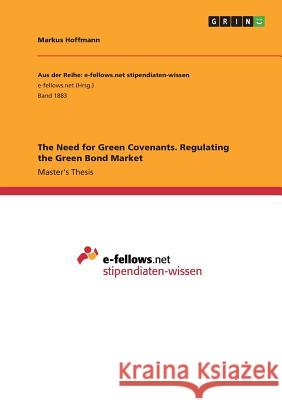The Need for Green Covenants. Regulating the Green Bond Market » książka
The Need for Green Covenants. Regulating the Green Bond Market
ISBN-13: 9783668251977 / Angielski / Miękka / 2016 / 44 str.
Master's Thesis from the year 2015 in the subject Law - Miscellaneous, grade: B, London School of Economics (Department of Law), course: Environmental Law, language: English, abstract: Green Bonds are a novel form of long term debt financing instruments enabling continued and sustainable economic growth in a finite physical world. The market for green bonds or Climate Bonds comprises of debt instruments, the proceeds of which are Earmarked for use in environmentally friendly projects. Introduced by the European Investment Bank (EIB) in 2007, the market for green bonds has been growing rapidly, reaching the record volume of USD 36.6 billion in 2014. Rapidly growing markets offer a myriad of opportunities for investors, but those opportunities come with certain risks attached. The risk addressed by this paper is a twofold one. Firstly, there is a risk to the environment if the proceeds of earmarked bonds are used for projects that do not actually benefit the environment. Secondly, there is a legal and financial risk to bondholders that arises when issuers of green bonds use funds for purposes other than those set out in the bond indenture. There are two steps that need to be taken in order to address these risks at the same time. First, a uniform standard of what defines a green bond or a specified range of Shades of Green has to be found and implemented. Second, a green bond needs to state explicitly, in its indenture, what purposes the funds will be used for and of what shade of green those purposes are, in order to empower bondholders to take legal action if covenants are broken. These clauses will be referred to as Green Covenants. This paper will start by briefly setting out the threat posed by climate change before continuing to introduce green bonds, explaining how they operate and why they will become part of the solution to climate change. Four varieties of green bonds, issued by four very different entities, will then be examined and it will be shown th











